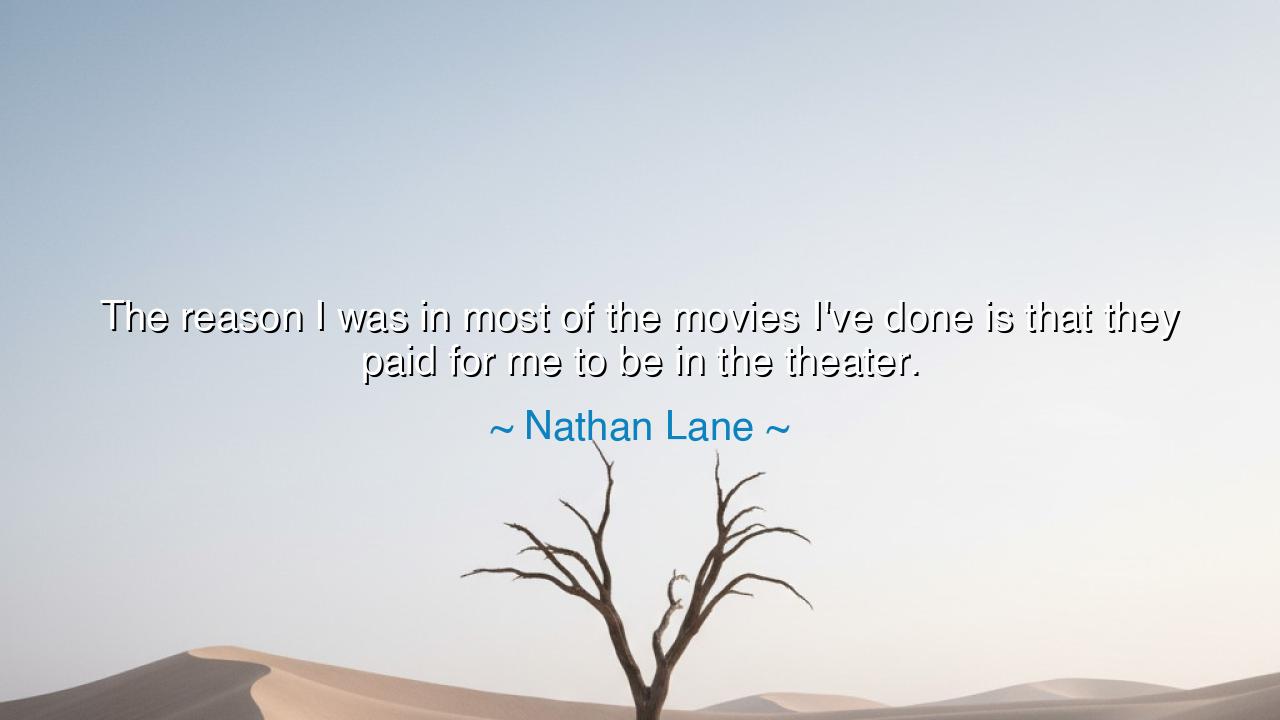
The reason I was in most of the movies I've done is that they
The reason I was in most of the movies I've done is that they paid for me to be in the theater.






Ah, Nathan Lane, whose words about his journey in the world of theater and film reveal an eternal truth about passion, purpose, and the deep connection between art and livelihood: "The reason I was in most of the movies I've done is that they paid for me to be in the theater." In these words, Lane reflects on the profound idea that his love for the stage and his craft as an actor were not simply sustained by fame or fortune, but by the opportunities that came through film. It was through his work in movies that he was able to pursue what truly fueled his soul: the theater, the place where the heart of the actor beats most strongly. In his simple reflection, we find a deep understanding of the interconnection between passion and practicality in the life of an artist.
In the ancient world, there was a profound understanding of the relationship between art and sustenance. Sophocles, the playwright whose works still echo through time, did not simply create for the love of his craft alone. The great theater festivals in Athens, such as the City Dionysia, were not only places of artistic expression but of political and social importance, where playwrights were often funded and supported by the state or wealthy patrons. These artists understood that the pursuit of the arts and the need for practical survival were not mutually exclusive. Like Lane, they found ways to live their passion while also engaging with the realities of the world around them, often relying on external support to allow their creative dreams to flourish.
In Lane’s statement, we find the wisdom of the ancients applied to the modern world. The actor’s life is not always one of fame or constant adoration; it is a journey of striving for artistic integrity while navigating the necessities of life. Lane acknowledges the reality that film provides not just fame but a means to sustain his theatrical aspirations, giving him the ability to pursue what he truly loves—performing live, where the exchange between the actor and the audience is immediate and profound. The ancients too understood that every art requires a foundation, whether it be patrons, sponsorship, or in some cases, the very society that supports the artist’s creation.
This notion of finding balance between art and practicality is found throughout the stories of the great figures of history. Leonardo da Vinci, the quintessential Renaissance man, was not only an artist but a scientist, engineer, and inventor, and he often relied on the support of patrons and rulers to fund his works. Yet, despite his success in these ventures, his true love remained in art. It was through patronage that he could continue to create, allowing his talents to be nurtured and his vision realized. Lane’s path, like da Vinci’s, is one of understanding that the arts often require external means of support to allow them to thrive in the world, even as the artist remains true to their passion.
In the realm of theater, much like in the ancient dramatic traditions, there is a deeper understanding of the sacrifice required to pursue the craft. The actor does not only perform for the love of the stage but also for the sustenance of the body, mind, and spirit. Lane, through his work in film, ensures the continuation of his theatrical journey, a journey that demands discipline, dedication, and sometimes, the willingness to accept external support to ensure that the creative fire does not burn out. Like Socrates, who often relied on the financial support of his followers to pursue his philosophical endeavors, Lane recognizes the balance of artistic integrity and the necessities of life, understanding that these forces are not in opposition, but are complementary.
The lesson to be drawn from Lane’s words is one of pragmatic passion—the understanding that art and livelihood are not always separate pursuits but can work in harmony. Art, whether in the form of theater, painting, music, or any other expression, often requires external support to flourish. This support may come in many forms—whether through film roles, patronage, or the recognition of society—but it is vital in allowing the artist to continue creating. Lane teaches us that it is possible to remain true to one’s passion while navigating the realities of the world, finding a way to support one’s art through practical means, so that the creative vision can continue to grow.
Therefore, let us take the wisdom of Lane and the ancients to heart: embrace both the passion of your craft and the realities of the world. Do not be afraid to seek external means of support that allow you to pursue what you truly love, for this is not weakness but wisdom. Whether in art, science, or any field of endeavor, we must learn to balance the need for sustenance with the desire for creative expression, understanding that both are necessary for a full and meaningful life. As Socrates, da Vinci, and Lane have shown us, the path of the artist is one that must weave together passion and practicality, and in doing so, one can achieve the balance necessary for both personal fulfillment and lasting contribution to the world.






AAdministratorAdministrator
Welcome, honored guests. Please leave a comment, we will respond soon